-
 Art of Wellness Acupuncture & Traditional Chinese Medicine (TCM)11704 Wilshire Blvd, Suite 295, Los Angeles, CA, 90025
Art of Wellness Acupuncture & Traditional Chinese Medicine (TCM)11704 Wilshire Blvd, Suite 295, Los Angeles, CA, 90025
myartofwellness@gmail.com310-451-5522 Office Hours
MonClosedTue7:30 am --4 pmWed7:30 am --4 pmThu7:30 am -- 4 pmFri7:30 am -- 4 pmSat7:30 am -- 4 pmSunClosedOur office opens from Tuesdays to Saturdays 7:30 am to 4 pm, will be closed on Memorial day, Independent day, Labor day, Thanksgiving day, Christmas and New year.
-
Recent Posts
- How to Treat Thoracic Outlet Syndrome With Acupuncture and TCM
- How to Treat Dupuytren’s Contracture With Acupuncture and TCM
- How to Treat Nutcracker Syndrome With Acupuncture and TCM
- How to Treat Rosacea With Acupuncture and TCM
- How to Treat Perioral Dermatitis With Acupuncture and TCM
- Lymphatic Drainage With Acupuncture and TCM
- How to Treat Turf Toe With Acupuncture
- How to Treat Nerve Pain With Acupuncture and TCM
- How to Treat Watery Eyes With Acupuncture and TCM
- How to Treat Ovarian Cysts With Acupuncture and TCM
- How to Treat Dystonia With Acupuncture and TCM
- Can Acupuncture Help Bad Breath?
- How to Treat Atopy with Acupuncture and TCM
- Plantar Fasciosis Treatment With Acupuncture and TCM
- How to Protect Yourself When Air Quality Is Poor
- How to Treat Spinal Headache With Acupuncture and TCM
- Sign up to receive news and updates and get my free report:“The Top 10 Reasons to Try Acupuncture”

August 2025 M T W T F S S 1 2 3 4 5 6 7 8 9 10 11 12 13 14 15 16 17 18 19 20 21 22 23 24 25 26 27 28 29 30 31
Inflammation
How to Treat Seizures With Acupuncture and TCM
By Qineng Tan, L.Ac., Ph.D. & Xiaomei Cai, L.Ac., Ph.D.

Sudden loss of consciousness, convulsions or jerking body parts, staring, feelings of fear, anxiety, deja vu? These are all possible signs of seizure. Epilepsy is a chronic neurological disorder that causes different types of seizures. Research has shown that acupuncture and TCM treatment for epileptic seizures can be an effective adjunct to conventional treatment.
Epilepsy is a common disease of the central nervous system that can happen to people of all ages. Epilepsy is a term that can refer to a variety of different types of seizures; it defines a condition in which a person has recurrent seizures. Over 3 million people in the U.S. have been diagnosed with epilepsy; it is one of the most common neurological disorders worldwide.
What is the cause of seizures? Unusual electrical activity in brain cells can cause various types of seizures, depending on what area of the brain is affected. In some cases, people begin to have seizures due to a head injury, or a brain infection, such as meningitis. Some people seem to be born with an unusual brain structure that affects the area of the brain that causes seizures. In older people, symptoms of epilepsy may coexist with those of other neurological conditions, such as Alzheimer’s disease, or seizures may start occurring as an effect of having suffered a stroke or heart attack. Seizures can be caused by an allergic reaction to some food, as when a person with Celiac disease is exposed to gluten. Medical science has not yet discovered the exact meaning of seizures that occur in other cases, but it is thought to be due to genetics.
People with epilepsy need treatment to try to prevent or reduce seizures. While some seizures are mild, others can be severe, and even life-threatening. TCM has been using acupuncture treatment and herbs to help seizures for many, many years, and recent research is beginning to demonstrate how TCM as integrative care for epilepsy can be beneficial.
What Happens During a Seizure?
The signs of seizure can vary widely from person to person, but an individual’s specific pattern of what seizures look like will usually remain consistent.
Symptoms of seizure include:
- A range of changes in awareness: from staring and being unresponsive, up to totally losing consciousness
- Stiffening of the limbs, limbs twitching, or part of the body shaking
- Changes in vision: double vision, seeing flashes of light, staring, or blinking repeatedly
- Dizziness, sudden headache
- Sweating, nausea
- Having trouble breathing, or stop breathing
- Falling down for no apparent reason, sudden collapse, head nodding, muscles go limp, sometimes called “drop attacks”
- Loss of bladder or bowel control
- Feelings of anxiety, panic attack, fear
- Sense of having an “out of body” experience
- Strange taste in mouth or smelling strange smells
- Feelings of confusion
- Drooling or frothing at the mouth, biting tongue or inside of cheeks
- After the seizure, a person may feel exhausted, or have amnesia, trouble remembering what happened.
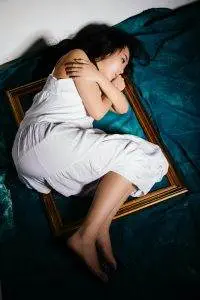
Historically, there have been many misconceptions about people who suffer from seizures, or “fits disease.” When a person is not having a seizure, they are usually otherwise healthy and capable. People with epilepsy are not necessarily limited in what they can do physically or mentally–except when they are having a seizure–,unless they have other chronic health problems in addition to epilepsy.
If you see someone having a seizure, DO stay near them and make sure they are safe. If they fall or seem to be unconscious, turn them onto their side and make sure they are breathing. DO NOT try to physically restrain a person who is having a seizure or attempt to put anything in their mouth. The idea that a person might swallow their tongue while having a seizure is a myth.
Top 10 Types of Seizures
There are many types of seizures. Sometimes a person has one one seizure caused by medication, drug withdrawal, illness, or some sort of trauma to the brain. A person may have a seizure due to an allergic reaction to some kind of medication or food. Experiencing one seizure does not mean a person is epileptic. Epilepsy is only diagnosed if a person has multiple seizures over time.
Seizures are divided into two main categories: focal onset or generalized onset. “Focal” refers to a seizure that originates from a localized part of one of the hemispheres of the brain. “Generalized” means that there is seizure-causing activity happening all over, or on both sides of the brain.
Specific types of seizure include:
- Focal Seizure with Retained Awareness – Or, “focal onset aware seizure.” Used to be known as a “simple partial seizure” or “partial seizures.” These are usually short in duration (less than 2 minutes) and a person remains conscious and aware while it is happening, although they may not be able to respond to people around them, or they seem “frozen.” The specific feelings vary widely: a sense of deja vu, sense of pressure or anxiety, a strange, overpowering smell, etc.
- Focal Onset Impaired Awareness seizure – also used to be called “complex partial seizures,” “temporal lobe seizures,” or “psychomotor seizures.” In this type of seizure, the person loses awareness of their surroundings. They may seem to be staring, zoning out, picking at their clothing, wandering aimlessly, smacking their lips, or making grunting sounds. These, too, are short in duration, and afterwards, the person may feel confused and very sleepy.
- Febrile seizures – these are seizures that are caused by having a fever over 100 degrees, usually as a result of having some type of infection, like a flu. Febrile seizure happens in young children; they may have shaking all over or jerking limbs, convulsions, or lose consciousness. Occasionally children may have febrile seizures in response to having a fever after receiving a vaccination. Febrile seizures do not cause brain damage or indicate a neurological disorder; they do not mean a person has epilepsy.
-

An absence seizure can last just a few seconds. Absence Seizure – used to be called “petit mal seizure.” This is a type of generalized onset seizure in which a person briefly loses awareness, or “blanks out” for just a matter of seconds. They are caused by abnormal brain activity, possibly related to hyperventilation. Absence seizures are more common in children, who may outgrow this disorder.
- Myoclonic Seizure – this is a very short kind of seizure that causes muscles to jerk or twitch for just a few seconds. “Myo” means muscle, and “clonus” means contraction and relaxation. These can happen to people with epilepsy, but myoclonic seizures can also happen to anyone. That feeling of being jerked awake and having a spasm in your legs when you are falling asleep is a kind of myoclonus.
- Tonic Clonic Seizure – this used to be known as “grand mal seizure.” This is the type of seizure that causes convulsions, stiff arms and legs, shaking all over, and other symptoms such as losing bladder control, crying out or making strange sounds, losing consciousness, and falling to the ground. A person who has experienced tonic clonic seizures before may notice an “aura” before the more severe symptoms of seizure begin; this might include a sense of vertigo, dizziness, nausea, feelings of anxiety, or strange smells or a weird taste in the mouth. Tonic clonic seizures may last a few minutes, and the person may be exhausted and emotional afterwards.
- Refractory Seizures or Uncontrolled Seizures – also called “drug-resistant” or “intractable” seizures, this is when a person has frequent and/or severe seizures that do not respond to medical therapy such as anti-epileptic medications.
- Lennox Gastaut Syndrome (LGS) – LGS is a rare form of epilepsy that shows up very early in life, usually when a child is still in infancy. Lennox Gastaut causes various kinds of seizures, both tonic (muscle spasms) and atonic (staring, still), or absence seizures. Children with LGS may experience multiple seizures per day, and have learning delays due to cognitive dysfunction.The cause of LGS is sometimes unknown, but it can be due to abnormal brain development, or a baby having some type of infection or loss of oxygen in utero, before they’re born.
- West Syndrome – also called “infantile spasms,” this is a type of epilepsy in young children that causes spasms and unusual movements for a baby, like throwing out of the arms, straightening the arms out to the sides, knees pulled up to the chest, the upper body bending forward, or head thrown back. West syndrome seizures only last a few seconds, and they usually go away by the time a child is past toddler years.
- Status epilepticus – This is a neurological emergency condition in which abnormal brain activity causes a prolonged seizure that lasts longer than five minutes, or multiple seizures that occur back-to-back without recovery in between. This can happen to a person who has epilepsy, or it can happen due to trauma, such as a head injury, or a hypertensive (high blood pressure) situation, or a severe reaction to drug toxicity, or an autoimmune disease response. There could be motor symptoms of shaking and collapsing, or the person could just be staring and unresponsive, depending on where the disordered activity is happening in the brain. Status epilepticus is a true medical emergency, and a person needs immediate attention to prevent brain damage.
Medical Treatment for Epileptic Seizures
Conventional treatment for seizures usually involves medications known as anticonvulsants (anticonvulsive), or anti-seizure medications. First, it is necessary for doctors to accurately diagnose the problem: what type of seizures is a person having, and what is causing them? Some drugs help to stop seizures from happening in the short term. Tranquilizers like Valium (Diazepam), Ativan (Lorazepam), and Klonopin may help to stop a seizure while it is happening, but people build up a tolerance quickly to these medications and then have to take higher doses to get the same effect. Other medications, like Aptiom, are taken daily to prevent seizures. There are many other medications used to treat different types of epilepsy, but these medications only work to control seizures in some cases. Other people may struggle to find a medication they can tolerate. Anticonvulsants and other anti-epileptic drugs can cause side effects like weakness, dizziness, headaches, nausea or vomiting, and skin rash.
People who experience seizures do need treatment to control epileptic symptoms, but it can be challenging to find the right combination of therapies. Acupuncture and TCM treatment offer an alternative treatment that may help to control seizures without negative side effects.
Can Acupuncture Help Epilepsy Symptoms?
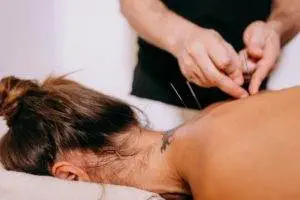
TCM has a long history–over 2000 years–of helping people who have epileptic seizures. The first documentation of acupuncture treatment for seizures by TCM practitioners was written at least 200 years B.C.. Specific Chinese herbs to treat epilepsy have been used for many centuries, and are now being studied through scientific research to prove their efficacy. Several studies have shown that various herbal formulations help to reduce the frequency of seizures.
Data also show that acupuncture treatment can help alleviate symptoms of epilepsy, reducing the occurrence of seizures through its positive effect on neurotransmitters in the brain.
According to TCM theory, epilepsy usually arises due to problems with the Liver system. Too much Wind affecting the Liver can cause spasms or convulsions. Liver Yang Rising can lead to muscle twitching and/or dizziness. An acupuncturist will use a combination of modalities such as acupuncture treatment, electro-acupuncture, Chinese herbs, and therapeutic massage to help seizures.
As with so many health conditions, inflammation plays a role in epileptic seizures. Auricular acupuncture (ear acupuncture) and electro-acupuncture (electro-stim) may have an anti-inflammatory effect on the brain that helps to reduce the frequency of seizures.
TCM theory posits that stimulation of specific acupressure points (such as “Shenmen” points on head or ear) for epilepsy can help to calm the mind and produce a positive effect on the parasympathetic nervous system.
A recent study compared patients who received the standard medication therapy for epilepsy with those who had acupuncture treatments for 12 weeks in addition to drug therapy. At a one year follow up, the patients who had received acupuncture for seizures had a statistically significant improvement of their epilepsy symptoms compared with patients who had received only the conventional medical treatment.
Acupuncture Near Me for Epileptic Seizures Los Angeles Area
It is challenging to manage seizures, but it is possible for people with epilepsy to live a long and healthy life with minimal disruptions. Living with a chronic and unpredictable health condition like epileptic seizures can cause emotional suffering in addition to physical symptoms. The holistic approach provided by TCM and acupuncture treatment can be considered as a safe form of complementary alternative medicine for epilepsy.
*This article is for education from the perspective of Traditional Chinese Medicine only. The education provided by this article is not approved by FDA to diagnose, prevent, treat and cure human diseases. It should not stop you from consulting with your physician for your medical conditions. Traditional Chinese Medicine is based on Qi, which is an invisible force that usually cannot be observed by modern science. Because science focuses on testing ideas about the natural world with evidence obtained through observation, these aspects of acupuncture can’t be studied by science. Therefore acupuncture and Chinese herbs are often not supported by double-blind, randomized trials, and they are considered alternative medicine therapies in the United States.
How to Treat HIV/AIDS With Acupuncture and TCM
By Qineng Tan, L.Ac.,Ph.D. & Xiaomei Cai, L.Ac., Ph.D.

What does it mean to be HIV positive? HIV is a viral infection that harms the immune system over time and, if untreated, can eventually lead to AIDS, a syndrome that causes people to become weaker and get serious infections easily. There is no cure for HIV/AIDS, but there are various therapies that can slow the progression of HIV. Acupuncture and TCM herbs can help to improve immune function and relieve symptoms related to the side effects of other HIV/AIDS drug therapies.
Human immunodeficiency virus (HIV) is an infection that affects the immune system by destroying the white blood cells (CD4 and T-cells) that are such an important part of the body’s immune response, causing people with HIV to be much more prone to all kinds of infections. Acquired immune deficiency syndrome (AIDS) is the late stage of HIV, in which the CD4 cells have reached a critical low point and other infections are taking hold in the body.
Over a million people in the U.S. are currently living with HIV. Many more people may have HIV and not know it. People can have HIV for several years without feeling any symptoms, while the illness is in its early stages.
HIV is a progressive illness, which affects the functioning of the immune system over a long period of time.
4 Stages of HIV Infection:
- Infection – when a person contracts the HIV virus, it spreads quickly in the body, often causing flu-like symptoms: fever, headache, rash, sore throat. If you have these types of symptoms, and you think you may have had contact with an infected person or a needle recently, it is very important to go get tested for HIV. Early testing allows people to get treatment as soon as possible, and to know if they are contagious and can spread the virus to others.
- Asymptomatic – the HIV virus remains in the body, causing damage to cells and weakening the immune system, while the person may have no symptoms of HIV/AIDS. This latent stage of HIV can last for quite a long time, averaging 8-10 years. This is why many people do not realize they have HIV until they are tested.
- Symptomatic – Eventually, a person with HIV will begin to feel the effects: fatigue, mouth sores from oral candidiasis, diarrhea, and weight loss. Other infectious diseases can easily get into the body because of the weakened immune system; these are called opportunistic infections. Common co-infections associated with HIV include: tuberculosis (TB), cryptococcal meningitis, toxoplasmosis, hepatitis, and pneumonia.
- HIV progression to AIDS – In some cases, people with HIV who receive treatment to help boost their immunity are able to stave off progression into the AIDS stage of illness. However, if the CD4 cell count drops and other infections take hold, a person is considered to have progressed into the AIDS stage.
Being diagnosed with HIV can be emotionally devastating. Knowing you have a serious illness with no cure is naturally going to cause a lot of stress, feelings of anxiety, and even depression. With good health care, it is possible these days to live a long life with HIV. Putting together a team of caring health care professionals who can provide integrative care for HIV/AIDS will help you maintain the best physical and mental health possible. TCM provides holistic care for patients living with HIV or AIDS that works on all levels: keeping your mental outlook positive, helping you sleep better, boosting immune function, and relieving symptoms that are due to side effects of medical treatment, or caused by concurrent infections.
How Do You Get HIV/AIDS?
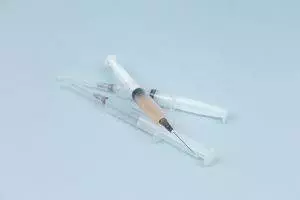
The HIV virus is carried through certain bodily fluids: blood, semen, vaginal secretions, and breastmilk. In order for HIV to be transmitted from one person to another, one of these types of body fluids must have the infection present in it, and must get into the other person’s bloodstream through broken skin or mucous membrane.
HIV is not transmitted through saliva, sweat, urine, or feces, and is not carried in the air in droplets. You cannot get HIV through water or air, or by touching surfaces. The way that HIV is most often passed from person to person is through sexual contact. Other ways you can get HIV are by sharing needles while using drugs, getting a tattoo with a needle that wasn’t properly sanitized, or a blood transfusion. (As a reminder: we only use single-use, disposable, sterile needles for acupuncture treatment.) A woman could also pass HIV to her baby when breastfeeding. Using condoms during sex and only using sterilized needles are the primary ways to prevent HIV infection.
Top 10 Symptoms of HIV
Most people with HIV will go through a long phase of having no noticeable symptoms. Eventually, after the virus has spread slowly, people with HIV will begin to show symptoms such as:
- Fatigue, feeling tired all the time
- Fever, or feeling hot even if you don’t show a fever
- Diarrhea
- Insomnia, night sweats
- Weakness, dizziness
- Weight loss, wasting, loss of appetite
- Nausea
- Skin rash, or purple spots on skin, bruise easily
- Shortness of breath
- Swollen lymph glands
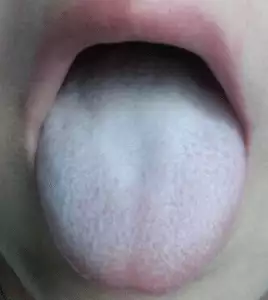
Oral candidiasis, also known as thrush or oral candida, is also common among people living with HIV because the suppressed immune system makes it easier for the fungal infection to take hold. Burning sensation or pain in the mouth cavity and redness with white patches are the signs of oral candidiasis. Long-term use of antifungal medication (Fluconazole) to control thrush can cause side effects and eventually cease to be effective as the body develops a resistance to it.
HIV can also lead to neurological problems, like peripheral neuropathy, in which the signals between the brain and the rest of the body are compromised, causing symptoms like: muscle twitching, loss of balance and coordination, tingling or burning sensations, or numbness.
Medical Treatment for HIV and AIDS
Advances have been made in medical treatment for HIV/AIDS. Different combinations of medications that block the replication of the virus can help to slow the progression of HIV in the body. This type of drug therapy for HIV used to be called HAART, short for “highly active antiretroviral therapy.” Now, it is usually referred to as ART or cART, which stands for “combination antiretroviral therapy.” This form of treatment for HIV can increase chances of survival and quality of life, but is not well-tolerated by all patients. Lifelong use of the medication is required, which, for some, makes HIV a manageable chronic illness. For other patients, the side effects of cART may not be tolerable. Side effects of HIV medications can involve gastric problems, headaches, fatigue, and peripheral neuropathy. Medications can cause liver dysfunction, damage to the liver, and bone marrow suppression, meaning fewer blood cells are being made by the bone marrow.
While a person is still in the asymptomatic phase of HIV, doctors may not begin using antiretroviral therapy because of concerns related to side effects and resistance. However, taking some steps to optimize immune function can potentially help stave off progression into symptomatic and AIDS stages. TCM herbs and acupuncture can be helpful during this phase to help strengthen the immune system and hopefully slow down the progression of disease.
Acupuncture and herbal treatment with TCM may also be used as an adjunct therapy during later phases in order to help people tolerate cART better by reducing nausea and other gastrointestinal effects of the medication and helping to improve appetite. For patients with HIV, TCM treatment is designed to help strengthen the body’s immune defenses in the hopes of preventing advancement to the AIDS stage of disease. For patients in the AIDS stage, TCM treatment focuses on helping to alleviate symptoms of opportunistic infections and to mitigate the side effects of other medications.
TCM for HIV/AIDS

What is HIV from the TCM perspective? TCM puts a lot of emphasis on the prevention of disease by maintaining a balance of yin and yang energies in order to protect the body’s Vital Qi. It is Vital Qi that keeps invasive illnesses like viruses from getting into the body and taking hold there. There are no TCM historical records that point specifically to AIDS, but we do have centuries of practice treating various kinds of invasive viral infections. Modern TCM practitioners apply this knowledge when treating patients with HIV/AIDS.
Syndrome factors of HIV according to TCM:
- Qi deficiency
- Blood deficiency
- Yin deficiency
- Yang deficiency
- Phlegm
- Dampness
- Qi stagnation
- Essence deficiency
An invasion of heat causes the early symptoms of HIV infection: fever, itching (pruritis), and fatigue. Then, later on, as the virus moves deeper into the body, toxic heat causes problems with the organ systems of the stomach, spleen, kidneys, and liver that lead to the weight loss and poor appetite indicative of later stages of HIV and AIDS. Herbal formulations can help relieve the diarrhea that is often reported by patients with AIDS/HIV. Herbs that work to help strengthen the spleen can improve fatigue, shortness of breath, nausea, diarrhea, and skin rash.
Strengthening deficient Qi is central to TCM treatment for HIV and can help to improve immune responses in the body. Chinese herbal formulations can aid in reducing the spread of the infection with results similar to those of cART medicines, while simultaneously having a positive effect on the immune system overall. Herbs do not come with the negative side effects associated with drug therapy for HIV/AIDS.
In addition to the other immune-related problems, people living with HIV/AIDS are also likely to have systemic inflammation. HIV can cause damage and inflammation in the gut, and cause blood clotting, making people more susceptible to cardiovascular problems and heart disease. Acupuncture has been shown to help reduce systemic inflammation in HIV patients. Some studies have suggested that herbs may help AIDS patients to live longer, and improve chances of long-term survival. Treatment of HIV with acupuncture and herbs can help to relieve symptoms and reduce the side effects of other treatments.
Acupuncture Near Me for HIV/AIDS in the Los Angeles Area
If you or someone you love is living with HIV, getting the best care possible as soon as possible is vital for improving the long-term outcome. Putting together a program of complementary health care for HIV/AIDS can help offer the best chances for survival, quality of life, and peace of mind.
*This article is for education from the perspective of Traditional Chinese Medicine only. The education provided by this article is not approved by FDA to diagnose, prevent, treat and cure human diseases. It should not stop you from consulting with your physician for your medical conditions. Traditional Chinese Medicine is based on Qi, which is an invisible force that usually cannot be observed by modern science. Because science focuses on testing ideas about the natural world with evidence obtained through observation, these aspects of acupuncture can’t be studied by science. Therefore acupuncture and Chinese herbs are often not supported by double-blind, randomized trials, and they are considered alternative medicine therapies in the United States.
How to Treat Hepatitis With Acupuncture and TCM
Qineng Tan, L.Ac., Ph.D. & Xiaomei Cai, L.Ac., Ph.D.

Fever, fatigue, abdominal pain, jaundice, dark urine–these are possible signs of Hepatitis infection, although many people infected with Hepatitis show no symptoms. For some people, a Hepatitis B or Hepatitis C infection goes away on its own, but in other cases, it can cause serious liver damage, leading to chronic liver disease. Acupuncture and TCM treatment, including Chinese herbs, offer a way to help improve liver function and reduce symptoms of Hepatitis.
There are several variants of the Hepatitis virus that can cause inflammation of the liver, leading to scarring (liver cirrhosis or liver fibrosis), and in some cases leading to chronic liver problems or liver cancer. Hepatitis B (HBV) and Hep C (HCV) are the types of infection that can lead to long-term illness and even liver failure. It is estimated that over 300 million people worldwide are living with the effects of HBV or HCV infections.
There is a vaccination that offers protection against Hepatitis B and Hepatitis A, but there is no vaccine for Hepatitis types C, D, and E. People who have contracted Hepatitis A or an acute form of HBV are usually told to rest and drink lots of fluids. Medical treatment for chronic Hepatitis that lasts for more than six months usually involves antiviral medications that help slow down the spread of the virus through the body. TCM treatment for Hepatitis with acupuncture and herbs works to improve the function of the liver and related organs (spleen, kidneys, gallbladder) and to strengthen the immune system so that the body can overcome the effects of the Hepatitis virus.
What Causes Hepatitis?
There are currently five different types of Hepatitis infection, referred to as: Hepatitis A, Hepatitis B virus (HBV), Hepatitis C (HCV or Hep C), Hepatitis D, and Hepatitis E.
All of these viral infections affect the liver, causing inflammation and possibly scarring, known as cirrhosis of the liver or fibrosis of the liver.
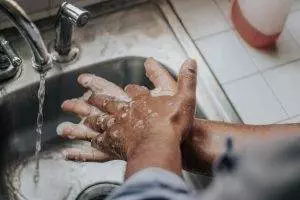
Hepatitis A and E viruses are carried in contaminated water or food supplies. People might contract the Hep A or Hep E virus through eating something like raw shellfish that was in contaminated water, or eating food prepared by a worker who did not wash their hands properly. These variants of Hepatitis may cause an acute infection, but do not lead to chronic conditions.
HBV and HCV are spread through bodily fluids like blood and semen, and can therefore be spread through sexual contact, or the sharing of needles, or a woman may pass the infection to her baby during birth. Hepatitis is a common co-infection in people living with HIV/AIDS. People with Cystic Fibrosis (CF) can also be more prone to infections and liver problems. These more serious forms of Hepatitis can lead to chronic illness, including cancer of the liver, or liver failure, making it one of the primary reasons people end up having a liver transplant.
Autoimmune hepatitis, which has also been called plasma cell hepatitis or lupoid hepatitis, occurs when the immune system mistakenly attacks liver cells.
Top 10 Symptoms of Hepatitis
Symptoms of a HBV or Hepatitis C infection often do not show up for a few weeks, a few months, or in some cases, years later. Some people, especially children, do not feel any symptoms of Hepatitis. The most common Hepatitis symptoms include:
- Abdominal pain, pain in right side
- Swelling in liver area, swollen belly (ascites – fluid buildup in the liver)
- Jaundice, yellow eyes, yellow skin
- Dark urine, pee is dark
- Light colored stools, poop is clay-colored
- Fatigue
- Nausea
- Fever
- Loss of appetite
- Joint pain
Bleeding easily or bruising easily are also potentially signs of Hep C, as is a skin rash, or itchy skin (pruritus), little blisters, or itchy patches of skin like psoriasis. Some people have a sensation of their internal organs itching.
What Is the Treatment for Hepatitis?
If a person shows high levels of liver enzymes and still has the Hepatitis B virus in their body after six months or more, they will often be prescribed medications aimed to slow the spread of the virus and prevent further damage to the liver. There are several types of antiviral medications used to treat patients with long-term effects of Hepatitis, some of them are pills (adefovir, entecavir, lamivudine, telbivudine, tenofovir) that are taken daily for a year, or for several years. Some, known as Interferons, are given as an injection a few times a week over the course of several months or more. These medications can slow the virus in some patients, but for some people, they may not do much to protect the body from liver damage or stop the virus from spreading. These medications can cause serious side effects, including headaches, dizziness, fever, and severe depression. Acupuncture and TCM methods offer an alternative or adjunct support to help promote better liver function and boost the body’s defense against the Hepatitis virus.
What Acupuncture and TCM Can Do for Hepatitis

Hepatitis infection is closely associated with the liver, as it is the liver that shows the most obvious damage as a result of infection, often resulting in cirrhosis or scarring of the liver. But according to TCM philosophy, the other internal organs work in concert with the liver, helping it to do the job of cleaning the blood and supplying it to the rest of the body. Patients with chronic Hepatitis B infection will demonstrate symptoms that help the acupuncture practitioner recognize a particular syndrome pattern, allowing them to use acupuncture points and Chinese herbs to work on deficiencies in the liver and other organs. In TCM theory, Hepatitis infection occurs due to pathogenic forces of toxic Heat and Dampness invading the body. The infection moves through different stages, and the TCM provider will tailor treatment with herbs, acupuncture, and moxibustion to the stage of infection and specific pattern of symptoms.
TCM differentiations of Hepatitis include:
- Liver Qi stagnation – causes symptoms like nausea, poor appetite, distension of the belly or bloated stomach
- Spleen and/or Kidney Yang deficiency – associated with poor appetite, loose stools, sallow complexion, weakness, loss of muscle
- Liver – Gallbladder Dampness and Heat – causes jaundice (yellowing of the eyes and skin), fever, nausea
- Liver – Kidney Yin Deficiency – indicated by headaches, dizziness, irregular periods, stiff joints, poor sleep, irritability, and ringing in the ears (tinnitus)
- Blood stasis – accumulation of blood in the liver contributes to fibrosis or cirrhosis, also causes pain in the lower rib area, menstrual problems, PMS, and depression.
A person may be more susceptible to getting Hepatitis because of some underlying deficiencies in their Qi, and/or the virus may cause those deficiencies to manifest. The main goal of acupuncture treatment for HBV or HCV, therefore, is to strengthen the liver, spleen, and kidneys, to clear any dampness or excess heat from these organs, and to increase the circulation of blood through the systems.
Traditional Chinese herb formulations have been shown in clinical trials to help improve liver function in patients with chronic Hepatitis B.
Herbs that help improve spleen function are believed to help rid the body of the virus and allow for healing of the liver.
Diet and nutrition are, naturally, also very important in helping to strengthen and detoxify the liver and other organs. Your TCM practitioner will go far beyond the usual advice (drink fluids, avoid alcohol), and will give you specific advice for a hepatitis diet plan.
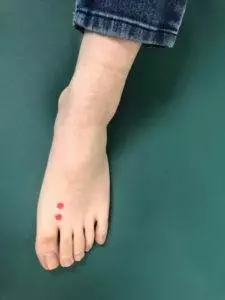
Acupuncture Near Me for Hepatitis in West LA
Chronic Hepatitis B and Hep C infections can be difficult to treat. Using acupuncture and herbs as an adjunct to conventional antiviral therapy for HBV may help to prevent further damage to the liver and improve organ function so that patients can recover from a chronic viral infection more fully. At Art of Wellness, we have over 30 years of experience providing integrative care for those suffering from chronic illnesses of all kinds.
*This article is for education from the perspective of Traditional Chinese Medicine only. The education provided by this article is not approved by FDA to diagnose, prevent, treat and cure human diseases. It should not stop you from consulting with your physician for your medical conditions. Traditional Chinese Medicine is based on Qi, which is an invisible force that usually cannot be observed by modern science. Because science focuses on testing ideas about the natural world with evidence obtained through observation, these aspects of acupuncture can’t be studied by science. Therefore acupuncture and Chinese herbs are often not supported by double-blind, randomized trials, and they are considered alternative medicine therapies in the United States.
How to Treat Tennis Elbow With Acupuncture and TCM
By Qineng Tan, L.Ac., Ph.D. & Xiaomei Cai, L.Ac., Ph.D.
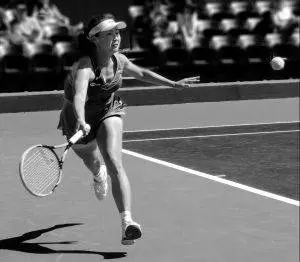
Pain in outer elbow or burning sensation in forearm? Tennis Elbow, also called lateral epicondylitis, is a pain condition caused by overuse or repetitive movements of the arm and wrist. Acupuncture and TCM can provide help with healing the muscles and tendons of the elbow and providing elbow pain relief of tennis elbow, golfer’s elbow, or tendonitis, so you can get back to your usual activities.
“Tennis elbow” gets its name from the fact that many people get this type of repetitive use injury from playing tennis and other sports that involve holding a racquet. But tennis elbow doesn’t only occur in athletes; it’s also common among people who have to perform repetitive movements that tax the muscles and tendons of the elbow, forearm, wrist, and hand and involve gripping an object, such as: painting, hammering and sawing (construction workers), cutting or chopping (cooks, chefs, butchers), using a wrench (plumbers), or working on an assembly line.
Tennis elbow is a kind of tendonitis, or inflammation of the soft tissues of the forearm. Tendonitis occurs when the soft tissues that attach muscles to bones sustain microtears and become inflamed. The major muscle involved in movements where the wrist and hand are gripping an object while the elbow is extending, or straightening, is the extensor carpi radialis brevis (ECRB) muscle. The ECRB muscle experiences friction as it moves over the bumpy joining of three bones in the elbow joint. Over time, and with overuse, the tendons that attach the ECRB to the bones can become torn and/or inflamed.
Tennis elbow pain is usually centered right in the outer side of the elbow, and just below the joint, but it can also radiate further down the arm and into the wrist. There might be a burning sensation in the muscle on the outer forearm. Pain and weakness in the elbow and wrist can make it difficult to perform regular actions like holding a cup or using a computer mouse.
Golfer’s elbow is a similar condition in that it is also an overuse injury that causes weakness and pain in the forearm. The difference is that with golfer’s elbow, also known as medial epicondylitis, the inflammation and microtearing occur in the muscles and tendons involved in flexing the arm rather than extending it, or bending the wrist inward towards the palm with a lot of force or speed. These are located on the inner part of the elbow and forearm. This type of repetitive use condition can be the result of swinging a golf club, throwing a baseball, hitting a forceful spin serve in tennis, but also such activities as shovelling, using a heavy tool like an axe or chainsaw, or even just carrying a heavy suitcase with your hand and wrist wrapped around the handle.
Tennis elbow pain can be resolved with rest, but for many people, complete rest is not a feasible or desirable option. Acupuncture treatment has been shown to help provide significant pain relief for tennis elbow. Acupuncture treatment can help to reduce inflammation and improve blood flow to injured areas to aid and speed healing of various types of tendonitis.
Top 5 Symptoms of Tennis Elbow
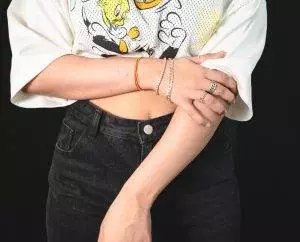
Signs of tennis elbow usually develop slowly over time and are not caused by any obvious single injury.
- Elbow pain or pain on the outside of the forearm, burning sensation in the outer part of elbow, stiff elbow
- Pain that radiates down to the wrist, wrist pain, stiff wrist
- Stiffness of the elbow, especially first thing in the morning
- Weak grip strength, reduced grip strength
- More severe pain when gripping an object, like a mug or racquet
Symptoms of golfer’s elbow are similar, except that the pain is located on the inner side of the elbow or forearm, as opposed to the outer side. Pain is more likely to radiate to the fourth and fifth fingers (ring finger and pinky finger) than to the wrist. You may feel pain when making a fist.
Wrist pain, tingling in the fingers, and weak grip strength can also be signs of carpal tunnel syndrome.
Medical Treatment for Tennis Elbow
The standard treatment for Tennis Elbow begins with rest, icing, and non-steroidal anti-inflammatory medications (NSAIDs like Ibuprofen or Acetaminophen) to reduce pain and swelling. If the pain persists, or perhaps if a person is not able to avoid the activities that are causing the inflammation, doctors may recommend wearing a brace and may administer steroid injections.
Surgical treatment for tennis elbow is relatively rare and only recommended in cases where rest and pain management medications are not working. An arthroscopic procedure to remove damaged and scarred tissue can help repair the muscles and tendons, but there is usually a long recovery time after the surgery.
A newer form of treatment for chronic tendon pain and inflammation is the F.A.S.T. procedure (Focused Aspiration of Scar Tissue). This is a less invasive procedure that uses ultrasound imaging and ultrasonic technology to remove tiny bits of damaged tissue without any incisions. Recovery time after this procedure is much shorter than with regular tennis elbow surgery.
While pharmacological treatment for pain may help to reduce immediate suffering, medications like NSAIDs and steroid injections come with significant side effects, even if they aren’t immediately apparent. Using these kinds of medications long-term to alleviate chronic pain can take their toll, sometimes causing gastrointestinal distress, weight gain, sleep problems, and other side effects that have a negative impact on overall health. Acupuncture treatment can act as an analgesic to relieve pain without any negative side effects. In fact, the side effects of acupuncture treatment are usually beneficial, including increased circulation, immune function, and stress relief.
Can Acupuncture Treat Tennis Elbow?
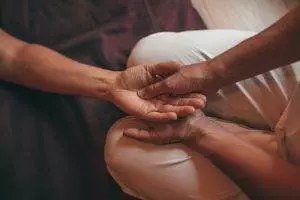
The treatment of chronic pain and inflammation with TCM goes back for many centuries. We use acupuncture and other methods to help relieve pain and reduce inflammation related to shoulder pain, knee pain, hip pain, neck pain, sprained ankle, and foot pain. TCM uses a variety of modalities to treat orthopedic pain conditions, including: acupuncture treatment, electro-acupuncture, moxibustion, cupping, Tui Na massage, exercise, and Chinese herbs in formulations for both internal (tea or pills) and external (pain patches) use. This multi-pronged approach can be very effective for reducing pain in the short term, while helping tissues to heal over time.
A controlled study in which patients suffering from lateral epicondylitis were divided into three groups and treated with either massage or acupuncture, or a combination of both, showed that patients who received the combination treatment experienced, for the most part, a complete recovery after twenty sessions.
Another controlled study that compared people suffering from chronic tennis elbow who were treated with real acupuncture versus sham acupuncture showed that at both the two week mark and the two month mark, people who had received acupuncture reported less pain and improved function of the arm joints.
Exercises and Pressure Points for Tennis Elbow Pain Prevention

If you are already experiencing tennis elbow pain or signs of golfer’s elbow, you may need to take some time off from sports or make accommodations to your work in order to rest the muscles and tendons of the forearm. Resting the arm is important for allowing inflammation to go down. Once you’re able to start exercising again, try these home remedies for tennis elbow that will help to prevent tendon problems in the future:
- To prevent repetitive stress conditions like tennis elbow and golfer’s elbow when playing sports, be sure to always warm up before playing and cool down afterwards. Practice your form, with a trainer if warranted, so that you know your technique is good and not contributing to pain or injury. Check your sports equipment regularly to make sure everything is in good condition and the right size and balance for you.
- Pressure points for tennis elbow: If you are experiencing pain in the elbow and forearm, you might try using this acupressure point to help tennis elbow pain: LI11 (Large Intestine Meridian 11) – located right in the crevice of the elbow crease, applying pressure to this point can help move Qi and blood through the joint and bring relief from tennis elbow pain. This point is also helpful for clearing heat and cooling you down after exercise, so it’s a good one to use right after a game or when you finish work.
- Exercises for Tennis Elbow – practicing gentle exercises that strengthen the muscles of the wrist and forearm can help prevent pain and tissue damage. Using light dumbbells or a flex bar can help with grip strength.
Acupuncture Near Me for Tennis Elbow on the Westside of Los Angeles
Whether you are an avid tennis player, or someone who works hard doing physical labor, elbow pain from lateral epicondylitis can really cramp your style. Athletes and active people of all ages need to take care of their bodies appropriately so as to avoid injuries that can lead to chronic pain. Adding acupuncture to your health regimen is a great way of providing basic maintenance for your body. Acupuncture treatment, therapeutic massage, and a good nutrition program can all help you keep your joints moving smoothly, without pain. At Art of Wellness, we have over 30 years of experience in helping to relieve orthopedic and musculoskeletal pain conditions.
*This article is for education from the perspective of Traditional Chinese Medicine only. The education provided by this article is not approved by FDA to diagnose, prevent, treat and cure human diseases. It should not stop you from consulting with your physician for your medical conditions. Traditional Chinese Medicine is based on Qi, which is an invisible force that usually cannot be observed by modern science. Because science focuses on testing ideas about the natural world with evidence obtained through observation, these aspects of acupuncture can’t be studied by science. Therefore acupuncture and Chinese herbs are often not supported by double-blind, randomized trials, and they are considered alternative medicine therapies in the United States.
How to Treat UTI With Acupuncture and TCM
By Qineng Tan, L.Ac., Ph.D. & Xiaomei Cai, L.Ac., Ph.D.
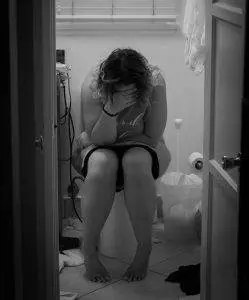
Why do I feel like I have to pee all the time? A urinary tract infection, usually referred to as UTI, is a bacterial infection that affects the bladder and/or other parts of the urinary system, causing urinary urgency, often accompanied by a burning pain when you go to the bathroom. Acupuncture and TCM is a good way to get to the root causes of frequent urination, including recurrent UTIs.
Urinary frequency, or an unusual urgency to urinate, can be caused by several different health conditions. A common cause of bladder pain, pressure on the bladder, or a burning sensation when peeing is a bacterial infection in the urinary tract, or UTI. But there can be many other reasons for constantly feeling like you have to pee, including diabetes, interstitial cystitis (IC), pregnancy, prostate problems, ovarian cysts, and more.
Over half of all adult women have experienced a UTI (also called cystitis) at some point in their lives. Many women get UTIs frequently, making them the most common type of non-hospital-related infection in the U.S. Up to 6% of all doctor visits are related to UTIs. A UTI can occur when bacteria, usually E. coli, gets into the urethra and travels up into the bladder, or further into the urinary tract. This can happen because of hygiene habits, after sex or exercising, or the use of contraceptives or period products. It can also happen when urine sits in the bladder for too long, or because a person has a weakened immune system.
While UTI treatment at home remedies such as drinking cranberry juice are popular, most women recognize that once they get that constant urge to pee, they have no choice but to rush to the doctor for antibiotics. Typical UTI medical treatment almost always involves confirming the infection by lab analysis, and a prescribed course of antibiotics, along with analgesic medicine (such as Pyridium) to help the UTI pain in bladder. Unfortunately, many women keep getting UTIs. Infections that are antibiotic resistant are increasingly common, and antibiotics do not get to the root of the problem.
Interstitial cystitis (IC), or painful bladder syndrome, is a condition that causes a constant sensation of having to pee, or bladder pressure, even when there is no infection present. Recurrent UTI and IC are a significant source of anxiety and depression for women, as they can cause almost constant pain and an inability to leave the house due to the constant urge to urinate.
UTI in men is not as common as UTI in women. The more common cause of frequent urination in men is benign prostatic hyperplasia (BPH), in which an enlarged prostate presses on the urinary organs, blocking the flow of urine, and causing backup that can lead to bacterial urinary tract infection men.
Sometimes what feels like a UTI might be something else. Growths in the pelvic area, such as ovarian cysts, uterine fibroids, or tumors can cause pressure in the bladder, bladder pain, or urinary frequency at night. Even when there is no infection, there may urinary symptoms such as:
- Strong urge to pee frequently (more than 8 times per day)
- Difficulty urinating
- Urine is different color than usual
- Pain during peeing, or burning sensation when peeing
- Nocturia, frequent urination at night
The conventional medicine answer to UTI is antibiotic treatment, but this is not the only answer for everyone. TCM methods of acupuncture and herbs can help with improving the function of bladder and kidney systems, reducing symptoms from recurrent UTIs, as well as helping to address the deeper problems that cause inflammation and pressure in the bladder.
Top 10 Urinary Frequency Causes
There are many possible causes of frequent urination.
- UTI (urinary tract infection, also called cystitis, or bladder infection)
- Kidney infection – when bacteria move further up into the urinary tract, the kidneys can become infected. Sometimes people with nerve damage in the spine cannot feel UTI symptoms (neurogenic bladder), so the infection becomes more widespread.
- Bladder stones – when the bladder does not empty completely, urine can crystallize and form hard stones, causing pain during urination.
- Interstitial cystitis (painful bladder syndrome) – a syndrome of urinary pain symptoms, the exact cause of which is unknown. Inflammation of the bladder lining may be due to trauma (from surgery or delivery/birth), overdistension, or dysfunction of the pelvic floor muscles.
- Prostatitis – inflammation of the prostate accompanied by irritation of the nerves in the area; not necessarily an infection, although a bacterial infection of the prostate can occur.
- Urinary incontinence – leakage of urine, occurs when the urethral sphincter that controls the flow and stoppage of urine is weak. More common in women and older people.
- Vaginitis – inflammation of the vagina, usually due to infection. Candida, or yeast infection, is one type of vaginitis.
- Diabetes – can cause a variety of urinary problems, due to the body producing more urine to process blood sugar, and nerve damage that leads to urinary retention and incontinence. Constant thirst is also a sign of diabetic urinary symptoms.
- Side effects of cancer treatment in pelvic area – cancer treatments that affect the pelvis, including radiation, chemotherapy, immunotherapy, and surgeries to remove pelvic organs, can all cause irritation or damage to the bladder.
- Overactive bladder (OAB) – a group of symptoms, including frequent urination, leakage, nocturia (getting up to pee at night), and primarily, a strong urge to urinate often. Considered to be caused by inappropriate signalling of the nerves that communicate between the brain and the urinary tract organs.

Causes of frequent urination vary somewhat according to biological sex. Frequent urination in men is often caused by prostate problems, while frequent urination in women may be due to pregnancy or other womens’ health conditions related to the ovaries or uterus.
Pressure on the bladder because of pregnancy, or from other organs, can also cause urinary frequency and discomfort. This can happen due to an anterior prolapse, when the pelvic floor is weakened, and the uterus, intestine, or bladder drop from their normal position. When a woman is pregnant, the heavy uterus often causes more frequent urination, or, in some cases, urinary retention. Damage or trauma to the pelvic floor can occur during delivery, so many women experience weak pelvic floor muscles, prolapsed uterus or bladder, and ongoing urinary urgency after they have had a baby.
In men, an enlarged prostate or prostatitis (infection and inflammation of the prostate) can put pressure on the bladder and other parts of the urinary system.
A frequent need to pee can also be caused by drinking too much coffee or alcohol, or taking diuretics.
Can Acupuncture Help Frequent Urination?
In Chinese Medicine, urinary problems come under the classification of “Lin Syndromes.” Lin disorders generally involve painful, “dribbling” urination and are caused by disharmonies in the Bladder and Kidneys, as well as involving other major organs like the Heart, Liver, and Spleen. Dampness and Heat are the primary pathogenic factors, so we use acupuncture treatment and herbal formulations to clear heat and dampness from the body.
Top 5 TCM differentiations of UTI:
- Damp Heat – characterized by frequent urination, burning sensation when peeing, painful pressure in bladder, dark urine or cloudy urine that smells unusual, feelings of nausea, bitter taste in mouth
- Heart Fire – frequency and urgency, thirst, hot, red face and chest, trouble sleeping/insomnia, irritability, anxiety, heart palpitations
- Liver Fire – excess heat causes painful burning during urination, headaches, ringing in ears/tinnitus, constipation, feelings of anger and frustration, redness in eyes and face.
- Fatigue Lin – covers urinary disorders that involve incomplete emptying of the bladder, due to prostate enlargement or prolapsed pelvic organs.
- Stone Lin – obstructions of the urinary system due to buildup of minerals that create stones in the bladder, kidney stones, etc.
Patients who have problems with recurring UTIs may be resistant to the antibiotics they’ve been given. TCM herbs can be used as an additional or alternative remedy from antibiotics and help to strengthen the immune system overall. One review of studies involving the use of Chinese herbal medicine (CHM) for UTIs concluded that the herbs, whether used alone or in conjunction with antibiotics, worked better than antibiotics alone.
One study showed that women who were prone to getting UTIs who were treated with acupuncture as preventative care only got a UTI one-third as often as women who didn’t receive acupuncture. Acupuncture has also been shown to be highly effective for bladder pain due to interstitial cystitis. Studies have also shown that TCM treatment can relieve the blockage of urine caused by an enlarged prostate (BPH).
Top 5 Tips for Preventing UTI

What a relief! Now that you’ve gotten over that urinary tract infection, it’s important to take steps to prevent getting another UTI. Here are some natural ways to prevent UTIs:
- Drink more water – This may seem counterintuitive, as you don’t want to have to pee even more. But you do want to be constantly flushing bacteria out of the urinary tract. Avoid drinks like coffee and soda, which can be irritating to the bladder.
- Go when you feel you need to – Some therapies for overactive bladder or IC involve training yourself to hold urine, but for most people, this is not a good idea. Retaining urine for too long contributes to bacterial growth and causes overdistension of the bladder.
- Hygiene – be sure to wipe from front to back when you go to the bathroom. Change clothes and underwear often, especially after sweating. During your menstrual period, change your pad and tampon frequently.
- After sex – always go to the bathroom and urinate before falling asleep.
- Avoid chemical products – Avoid using deodorants, douches, or scented wipes around the genital area. Consider whether contraceptive products like spermicides might also be part of the problem.
Acupuncture Near Me for UTI
While it is rare for a UTI to become so serious that you have a fever or become nauseated, urinary problems should be taken seriously before they become worse. If your UTIs keep coming back, or you constantly feel like you have to pee, it may be a sign that there is something deeper going on. As people age, urge incontinence, prolapsed organs due to weak pelvic floor muscles, and nerve damage can lead to more serious bladder problems. TCM provides a holistic way to treat urinary tract issues, as well as other, possibly hidden conditions in the pelvic region. Urinary urgency may be a signal of something else, so don’t ignore it. Consult with your acupuncturist to find urinary frequency relief.
*This article is for education from the perspective of Traditional Chinese Medicine only. The education provided by this article is not approved by FDA to diagnose, prevent, treat and cure human diseases. It should not stop you from consulting with your physician for your medical conditions. Traditional Chinese Medicine is based on Qi, which is an invisible force that usually cannot be observed by modern science. Because science focuses on testing ideas about the natural world with evidence obtained through observation, these aspects of acupuncture can’t be studied by science. Therefore acupuncture and Chinese herbs are often not supported by double-blind, randomized trials, and they are considered alternative medicine therapies in the United States.
